Category Archives: AOA News Letter
TRAINING “FUNDAMENTAL GUARANTEES OF THOSE IN POLICE CUSTODY – INTERNATIONAL STANDARDS” WAS HELD.
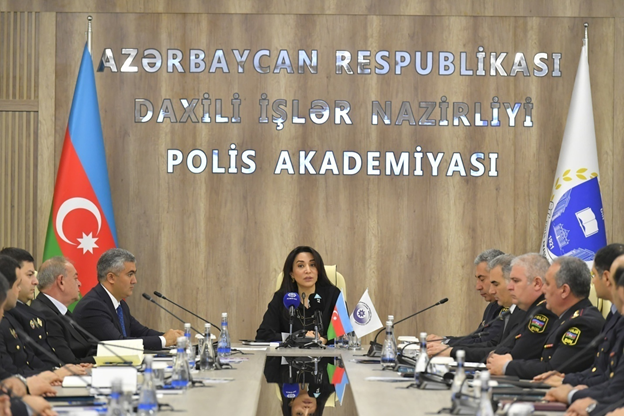
Within the framework of the “Year of the Constitution and Sovereignty,” the training “Fundamental guarantees of those in police custody- international standards,” organized by the Ombudsman of Azerbaijan, was held at the Police Academy of the Ministry of Internal Affairs.
The Ombudsman, Sabina Aliyeva, opened the ceremony and wished the training success.
In her speech, the Ombudsman noted the Ombudsman Institution has very effective co-operation with the Ministry of Interior Affairs and that both institutions work in the protection of human rights on the basis of principles of mutual co-operation and satisfaction of citizens.
The Ombudsman stated that, within the framework of the National Preventive Mechanism, monitoring visits have been carried out in institutions where detained persons cannot leave at their own free will, including police custodial settings.
The Commissioner stressed the importance of increasing professional knowledge about international standards, including continuing to raise awareness among employees of the Ministry.
Noting also the significance of the protection detainees’s rights, awareness-raising activities encouraging the legislative improvements, the Ombudsman said that this training significantly facilitates increasing legal culture in this regard.
Later, the Ombudsman’s representatives shared insights on monitoring visits under NPM mandate, relevant international standarts and mechanisms, legal assistance, fundamental rights of individuals in police custody, etc.
In conclusion, broad discussions were held and questions raised were answered.
“A FUTURE OF INTEGRITY IN BUSAN” STARTS IN THE CLASSROOM: ACRC PARTNERS WITH BUSAN’S EDUCATION SECTOR.

– The Anti-Corruption and Civil Rights Commission (ACRC) signed Memoranda of Understanding (MOUs) with Pusan National University (PNU) and the Busan Metropolitan City Office of Education to promote integrity education.
– The parties agreed to collaborate to ensure the consistent and effective implementation of integrity education at all levels of schooling, from elementary to university.
The Anti-Corruption and Civil Rights Commission (ACRC, Chairperson Ryu Chul Whan) signed separate Memoranda of Understanding (MOUs) on April 25 with Pusan National University (PNU, President Choi Jae-Weon) and the Busan Metropolitan City Office of Education (Superintendent Kim Seokjoon) to foster mutual cooperation in promoting integrity education for future generations.
These MOUs aim to lay the foundation for future generations—including elementary, middle, and high school students, as well as university students to internalize the values of integrity in their daily lives and become integrity-driven individuals who will lead various sectors of society.
Through this MOU with Pusan National University and the Busan Metropolitan City Office of Education, the ACRC plans to actively support the development of integrity-minded individuals in the Busan region by providing integrity education to university students and faculty members; offering and operating regular academic courses on integrity; jointly utilizing participatory integrity education content for elementary, middle, and high school students; and identifying key initiatives and strengthening collaboration to enhance integrity at educational settings.
In addition, the ACRC plans to host an integrity lecture for public officials at Busan City Hall, to be delivered by Chairperson Ryu Chul Whan to help foster a culture of integrity in the city’s public service.
Chairperson Ryu Chul Whan of the ACRC said, “Instilling a strong sense of integrity in future generations is crucial not only for strengthening national competitiveness but also for serving as a cornerstone of sustainable growth.” He added, “I look forward to strengthening the effectiveness of integrity education at all levels and nurturing future leaders with integrity in various fields through close cooperation with educational institutions in Busan.”
WAFAQI MOHTASIB (OMBUDSMAN) INAUGURATES REGIONAL OFFICE AT DERA GHAZI KHAN.
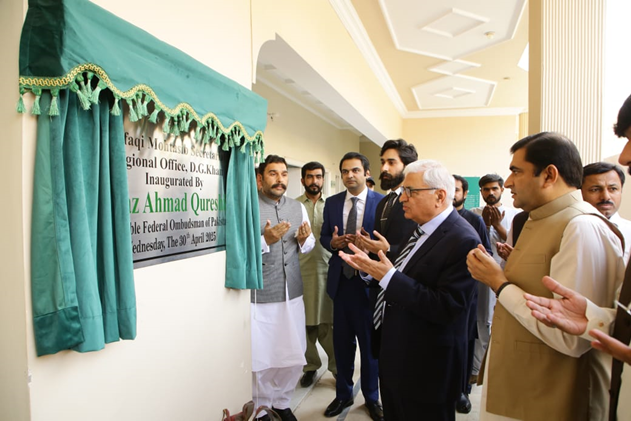
- Wafaqi Mohtasib (Ombudsman) Inaugurates Regional Office at D.G. Khan
- All out Efforts to Dispense Administrative Justice to the People of Far Flung Areas – Ejaz Ahmad Qureshi
The Wafaqi Mohtasib (Ombudsman), Mr. Ejaz Ahmad Qureshi has formally inaugurated the Regional Office at Dera Ghazi Khan here today, which brings the number of Wafaqi Mohtasib’s Regional Offices to 26 in the country.
Speaking on the occasion, the Wafaqi Mohtasib expressed the resolve that the efforts would continue for prompt disposal of public complaints and dispensing administrative justice to the people of far flung and backward areas. He urged the government officials to ensure speedy resolution of public complaints closer to the doorsteps of the people. He said that there was a continuous increase in the redressal of public complaints since 2024, which reflects the trust and the confidence the general public has in the viability of this institution.
The Wafaqi Mohtasib further added that efforts have been made to expand outreach and accessibility of the institution during the last couple of months as new regional offices have been established at Muzaffarabad (AJ&K), Gilgat Baltistan, Mirpur Khas (Sindh) and Sahiwal (Punjab) to facilitate the public.
The inaugural ceremony was attended by a large number of the local heads of the Federal Government agencies apart from civil society members and the media. Later, talking to the media representatives, the Wafaqi Mohtasib informed that more than 226,372 complaints have been received last year, out of which 223,198 have been resolved satisfactorily. The implementation rate also stood at an impressive 92.31%.
The Wafaqi Mohtasib further informed that 126 Khuli Katcheries have been held during the outgoing year and 171 visits were undertaken to the remote and far-flung areas for dispensing quick administrative justice in addition to the 79 Inspection Visits under the OCR programme intended for improving the service delivery operations of the various federal government agencies.
He said that our Investigating Officers held Khuli Katcheries at the remote and far off places with a view to dispensing administrative justice on the spot.“Due to the untiring efforts of the officers and our staff members and owing to the initiatives like the Informal Resolution of Disputes (IRD), the general public have been benefitted and their complaints being addressed in large numbers. Similarly, the complaints relating to the Children and Overseas Pakistanis have also been taken care of since there are separate Grievance Commissioners for Children and Overseas Pakistanis, working in the Wafaqi Mohtasib’s Office.
RESPONSE TO PUBLIC DEMAND SHOULD BE BASED ON THE PRINCIPLES OF GOOD FAITH AND RATIONALITY.
In 2024, a complainant reflected to the CCAC that he had booked the facility of Outdoor Football Field of the Olympic Sports Centre at the Sports Bureau (ID) for use at 20:00 one day, but in the afternoon of that day, the Meteorological and Geophysical Bureau (SMG) announced that it would issue typhoon signal no. 8 at 22:00 that day. Considering the potential safety hazards on the way back home from the facility, the complainant cancelled the booking and requested the ID for refund. However, he was rejected by the ID.
Upon investigation, typhoon signal no. 3 was issued at 05:00 on the day when the relevant case occurred. The SMG announced at 17:00 that day that it would issue typhoon signal no. 8 at 22:00. Afterwards, the relevant signal was officially issued on time.
However, the ID explained to the CCAC that according to the rules of purchasing tickets of the relevant sports facilities, when the grounds of outdoor facilities are slippery due to the weather when typhoon signal no. 3 is issued, the users who have not yet used the facilities may apply to the ID for refund within a designated time limit. Nevertheless, the grounds of the outdoor facilities of the same type were not slippery at the same time slot on the same day as they were made of special materials and the facilities remained open as usual at that time. For this reason, the ID rejected the relevant application as it did not meet the aforesaid requirement.
The CCAC considered that since the SMG had clearly announced the issuance of typhoon signal no. 8 at a particular time in advance and there were safety risks on the way to and from the facility, the ID should more properly respond to residents’ reasonable demands in accordance with the principles of good faith, debureaucratisation and efficiency after ascertaining the relevant facts in order to ensure the quality and effectiveness of public administration work.
The ID agreed with the suggestions of the CCAC. It reviewed afresh the case and refund applications of the same type for that day and made a refund. Moreover, it reviewed and optimized the rules of purchasing tickets of relevant sports facilities.
OMBUDSMAN PROBES ENHANCED MANAGEMENT OF COUNTRYSIDE ANCILLARY TOURIST FACILITIES TO PURSUE “TOURISM IS EVERYWHERE”.
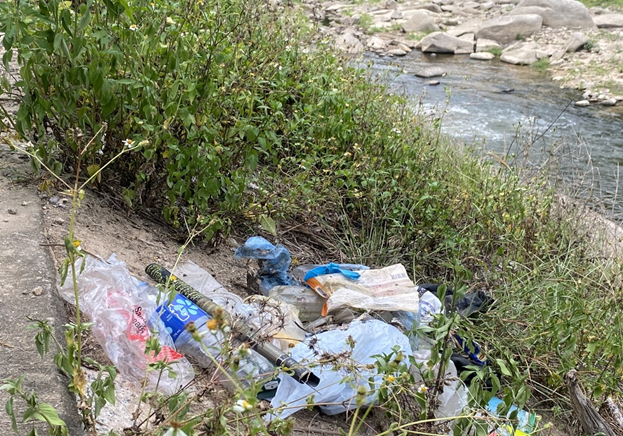
The Ombudsman, Mr. Jack Chan, today (29 May) announced the launch of a direct investigation operation to examine the Hong Kong Special Administrative Region Government’s management of countryside ancillary tourist facilities to align with its efforts to develop green tourism and the pursuit of the ideas of “tourism is everywhere” and “sightseeing all over Hong Kong”.
In recent years, the Government has actively promoted green tourism to attract visitors from around the world to explore Hong Kong’s natural landscapes. Some hiking routes, such as Dragon’s Back, have been hailed by international media as the best in the city. Country parks and ancillary facilities, including hiking trails, toilets, rubbish bins, emergency distress facilities, drinking water stations, and signage, are primarily managed and maintained by the Agriculture, Fisheries and Conservation Department (“AFCD”), while the Civil Engineering and Development Department and the Home Affairs Department are also engaged in related work. In addition, AFCD, in collaboration with the Tourism Commission, has implemented the Enhancement of Hiking Trails programme since 2018 to improve the ancillary facilities of hiking trails in country parks, which are popular with and appealing to tourists.
However, the Office has noted from media reports the relevant departments’ failure to properly manage and maintain ancillary tourist facilities in countryside areas. Issues include inadequate toilets and poor hygiene conditions, and scattered and rarely updated information on transportation and location of toilets and water filling stations in country parks. Moreover, there have been incidents where damaged hiking trails remained unrepaired and neglected, and fallen trees were unremoved for months after typhoons, extremely heavy rain or landslides, posing potential risks to hikers and visitors. Furthermore, the Office has from time to time received complaints about the slow progress of countryside facility maintenance and insufficient supporting resources, such as delays in rain shelter repairs and insufficient publicity for visitor centres.
Mr. Chan said, “Proper management of countryside ancillary tourist facilities not only helps protect the safety of hikers and visitors but also enhances the outdoor experience for members of the public and tourists, thereby strengthening Hong Kong’s appeal as a green tourism hotspot. I have noticed that, for example, during the recent Labour Day Golden Week with many people and tourists travelling to the countryside to enjoy the beautiful mountains and coastal scenery of country parks, problems such as garbage accumulation and traffic congestion emerged. I consider it essential to examine how to improve the ancillary facilities in the countryside, so as to ensure that all these facilities function effectively and are maintained in safe and good condition, and information for visitors is accurate and clear. In this light, I have decided to launch a direct investigation operation to examine the work of AFCD and other relevant departments on the management and maintenance of countryside ancillary tourist facilities, the dissemination of information on hiking activities and countryside facilities, particularly safety-related information for hikers, as well as the division of responsibilities and co-ordination among different departments regarding the management and maintenance of relevant facilities. Where necessary, pertinent recommendations will be made for improvement.”
WAFAQI MOHTASIB OPENS WEBINAR ON “OMBUDSMANSHIP: COMPLYING WITH THE INTERNATIONAL STANDARDS”.

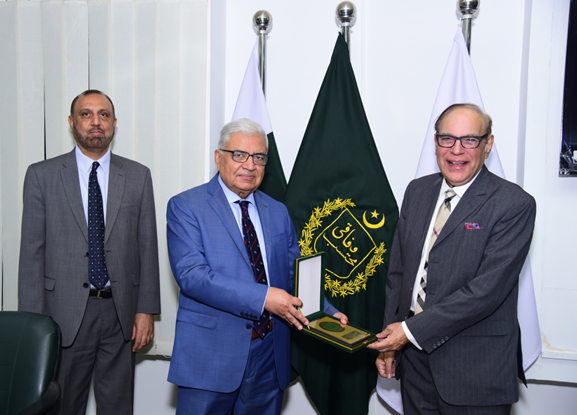
- Wafaqi Mohtasib Opens Webinar on “Ombudsmanship: Complying with the International Standards”.
- Highlights the Role of Ombudsmanship in Pakistan and Promoting Good Governance through redressal of grievances.
Islamabad: Ombudsman and Ombudsman-like institutions are playing a critical role in upholding the rule of law, redressing grievances, thus fostering good governance. This was stated by the Wafaqi Mohtasib (Federal Ombudsman), Mr. Ejaz Ahmad Qureshi, while addressing a webinar on “Ombudsmanship: Complying with the International Standards”, at the Wafaqi Mohtasib Secretariat.
Mr. Ejaz Ahmad Qureshi, who is also the current President of the 47-member strong Asian Ombudsman Association, said that it is a matter of great satisfaction that the institution of Wafaqi Mohtasib (Federal Ombudsman) has emerged as a reliable forum to address public grievances expeditiously and without any financial costs. He informed that the Wafaqi Mohtasib aligns its operations with the universally acclaimed benchmarks which are commonly known as the Paris Principles, the Venice Principles and the latest UN General Assembly Resolution 79/177. The provisions of these international instruments provide comprehensive guidelines for efficient discharge of the mandate of ombudsman institutions, he maintained. Mr. Qureshi, further added that compliance with international standards lends greater credibility and legitimacy to the functioning of the ombudsman institutions all over the world.
The Principal and Dean of NUST Law School, Mr. Justice (Retd.) M. Nawaz Wahla in his keynote address, highlighted the significance of the international standards which characterized the functioning of the ombudsman and mediator institutions. He said that the UN General Assembly, through multiple resolutions has recognized the importance of ombudsman and mediator institutions in promoting and protecting human rights and fundamental freedoms in addition to good governance and respect for the rule of law.
The Webinar was attended by a large number of member institutions of the Asian Ombudsman Association (AOA), the OIC Ombudsman Association (OICOA), the Forum of Pakistan Ombudsman (FPO), members of academia and civil society.
THE OMBUDSMAN IN COOPERATION WITH MINISTRY OF PRESCHOOL AND SCHOOL EDUCATION IMPLEMENTS “OMBUDSMAN HOUR” PROJECT.
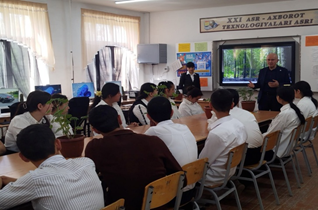
Since 2023, the Commissioner of Oliy Majlis for Human Rights (Ombudsman), in cooperation with the Ministry of Preschool and School Education of the Republic of Uzbekistan, has been implementing the “Ombudsman Hour” project across the country with the goal of increasing students’ legal awareness. To make the lessons non-traditional, creative, and engaging, the Ombudsman has prepared a series of video lessons.
The next series of “Ombudsman Hour” lessons were organized for students of the following public schools:
- No. 14 in Balikchi district of Andijan region;
- No. 28, 39, and 40 in Uchqo‘rg‘on district and No. 2, 4, and 12 in To‘raqo‘rg‘on district of Namangan region;
- No. 4, 18, 19, and 24 in Nurota district and No. 2, 18, 22, and 78 in Xatirchi district of Navoi region;
- No. 5 in Jondor district of Bukhara region;
- No. 285 and 331 in Yangihayot district of Tashkent city;
as well as for students of the University of Economics and Pedagogy in Qarshi city.
The lessons, rich in interactive Q&A sessions, provided upper-grade students with a clear understanding of the essence of human rights and freedoms, as well as their personal, political, social, economic, and environmental rights, explained through real-life examples. Additionally, detailed information was provided about the activities of national institutions operating in the field of human rights.
THE OMBUDSMAN MONITORES, CONDITIONS AT SEVERAL CLOSED INSTITUTIONS IN NAVOI REGION.
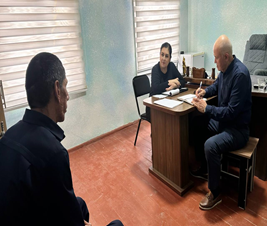
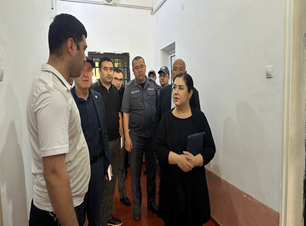
On April 24, 2025, under the leadership of the Commissioner of Oliy Majlis for Human Rights (Ombudsman), members of the Public Groups operating within the framework of the National Preventive Mechanism (NPM) conducted monitoring visits to several penitentiary institutions in Navoi region. Representatives of the media also participated in the visits.
The first destination was the Temporary Detention Center in Navoi city. During the monitoring, the team assessed the living conditions, food supply, access to medical services, and the facilities for investigation and meetings with lawyers for detainees.
Next, the team visited Correctional Colony No. 11 in Navoi city. Here, 14 vocational training circles have been established to teach inmates skills such as sewing, electrical work, beekeeping, livestock and poultry farming, agriculture, carpentry, soft furniture production, and English language. Inmates who receive vocational training certificates are employed in 18 production workshops, helping them develop a sense of responsibility and facilitating their social reintegration after release. Special attention was paid to working conditions and food provision for inmates.
During the monitoring, both group and individual interviews were conducted with inmates, and their appeals were accepted.
In cooperation with the regional Department of Health, a team of specialized doctors also carried out in-depth medical examinations of inmates at the colony. Similar activities were organized at Correctional Colonies No. 4, No. 5, and No. 12 in the region.
The next destination was the Navoi Regional Narcology Dispensary, where conditions for patients were examined. The monitoring team assessed living quarters, the canteen, sports rooms, medical units, storage conditions for medicines, and compliance with sanitary and hygiene standards.
The monitoring visits will continue on April 25.
TRAINING FOR PUBLIC DEFENDER’S STAFF ON SEXUAL VIOLENCE.

On April 24-25, 2025, training was held for the staff of the Public Defender’s Office of Georgia on the topic of sexual crimes, which covered issues of effective investigation of cases of sexual violence, criminal prosecution, trial and access to justice, including:
- Understanding sexual violence crimes from a gender perspective in accordance with the Istanbul Convention, international human rights law and criminal justice standards;
- Evidentiary standards and the importance of context-based investigation;
- Studying victim-centered strategies, including during interviews;
- Identifying myths and stereotypes about sexual violence;
- Analyzing specific circumstances for persons with disabilities and other particularly vulnerable persons, introducing victim-centered and context-based approaches.
The knowledge gained during the training will assist the Public Defender’s Office of Georgia in monitoring cases of sexual violence, examining individual cases and exploring the above-mentioned issue.
The meeting was held with the support of the Council of Europe project “Reinforcing gender equality and implementing GREVIO recommendations to combat violence against women and domestic violence in Georgia”.
PDHJ AND KOMNAS HAM ADVANCE CROSS-BORDER HUMAN RIGHTS COOPERATION.
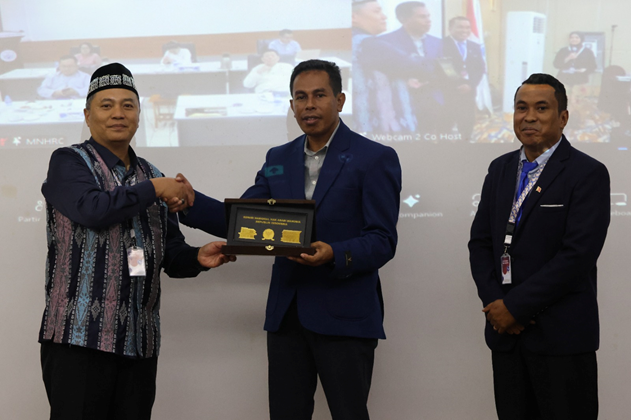
Jakarta, 24 April 2025 – The Provedoria dos Direitos Humanos e Justiça (PDHJ) of Timor-Leste and the National Human Rights Commission of Indonesia (Komnas HAM) are taking concrete steps toward formalizing a bilateral cooperation agreement focused on enhancing human rights protections in the border areas between the two countries.
The cooperation initiative began with a high-level meeting in Dili on 17 October 2024, where Provedor Virgílio da Silva Guterres ‘Lamukan’ and Komnas HAM Chairperson Atnike Nova Sigiro agreed on the importance of addressing key cross-border issues—such as statelessness, labour rights, and access to basic services—through structured collaboration.
The proposed cooperation includes joint studies, human rights seminars, capacity-building for border officials, and the development of policy responses to better protect vulnerable communities along the border. To formalize this partnership, both institutions committed to preparing a Memorandum of Understanding (MoU), with the aim of launching collaborative activities in 2025.
As a follow-up, during the First SEANF Technical Working Group Meeting held in Jakarta from 23 to 24 April 2025, PDHJ’s Head of Cabinet, Áureo José António Savio, met with Komnas HAM Secretary General Henry Silka Innah to discuss the progress of the MoU and outline the next steps.
Both sides reaffirmed their commitment to finalizing the technical and procedural elements of the agreement. The MoU is expected to be signed on the sidelines of the Second SEANF Technical Working Group Meeting, which is scheduled to take place in July 2025 in Indonesia.
This evolving partnership represents a significant step toward establishing a sustainable, cross-border human rights cooperation model that addresses the specific needs of communities in the Timor-Leste–Indonesia border region. It also demonstrates a shared commitment to regional solidarity, mutual learning, and the promotion of good governance and human dignity.
